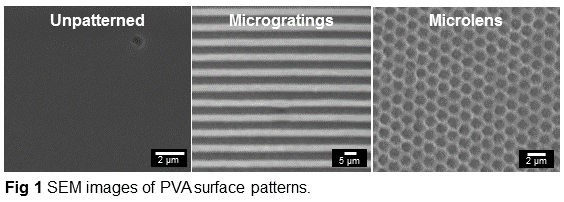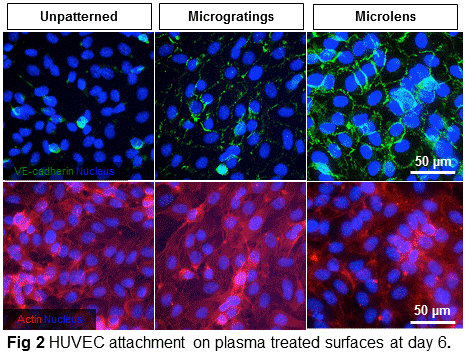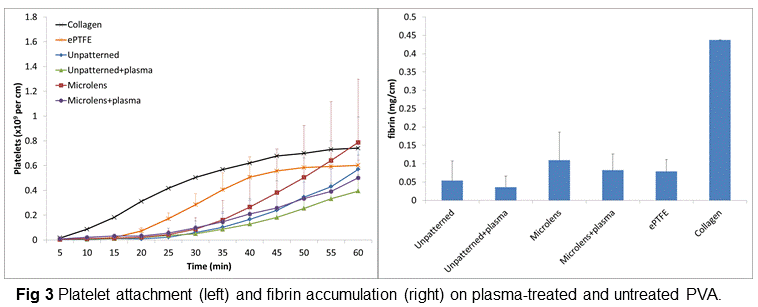Introduction: Synthetic vascular grafts are needed in ~20% of coronary artery bypass cases, where autologous grafts are not available. However, current biomaterials fail at small diameters due to the compliance mismatch between the native artery and the stiff material and the lack of an endothelial layer. These issues lead to tissue ingrowth and long-term stenosis. Attempts to tissue engineer a vascular graft have yet to achieve success, and cell-based therapies are often plagued by the long and costly process of cell isolation and expansion before use. This work aims to create an off-the-shelf, compliant vascular graft capable of stimulating endothelialization and reducing intimal hyperplasia in vivo. To complete these goals we used chemical and topographical surface-modified poly(vinyl) alcohol (PVA) biomaterials to eliminate the compliance mismatch and encourage endothelial cell (EC) growth.
Materials and Methods:

PVA biomaterial grafts: An aqueous solution of sodium trimetaphosphate crosslinker and PVA was cast onto 4mm diameter cylindrical molds, which were either smooth or patterned. Samples were cast with protein solution in the lumen or plasma treated with N2 gas (Fig 1).
Cell attachment and quantification: Human umbilical vein endothelial cells were seeded on PVA for 1 or 6days. After fixation, they were stained for F-actin, VE-cadherin, and nuclei. Cell attachment was quantified at 24hrs.
Hemocompatibility testing: A well-established, non-human primate arteriovenous shunt model was used to quantify hemocompatibility. A chronic shunt was surgically implanted between the femoral artery and vein. Autologous platelets were labeled with 111In and infused with 125I-fibrinogen prior to study. Platelets were quantified every 5min for 60min using a gamma camera. After the 111In decayed, fibrin was quantified. A clinical standard ePTFE graft was used as a negative control and collagen-coated ePTFE was used as a positive control.
Results and Discussion:

Cell counts were significantly increased on plasma-treated samples for all surface topographies with confluent monolayers seen by day 6 (Fig 2). All grafts remained patent for the duration of the shunt study. While no significant differences were seen in platelet attachment, PVA samples, even with plasma treatment, exhibited minimal platelet or fibrin accumulation (Fig 3). This reflects our previous results, which indicated the promise of PVA as a blood-contacting material[1].

Conclusions: The PVA grafts have excellent hemocompatibility properties showing minimal reactions in a stringent ex vivo shunt model lacking any anti-coagulation. The addition of plasma treatment encouraged endothelialization in vitro. Future studies will examine additional topographies with the plasma treatment to encourage a healthy EC phenotype, migration, proliferation, and retention under flow. We will also implant these grafts to determine their in vivo potential for endothelialization and preventing tissue ingrowth.
Jennifer Greisel; Dr. Michael Wallisch
References:
[1] Cutiongco, M. F. A., Anderson, D. E. J., Hinds, M. T. & Yim, E. K. F. In vitro and ex vivo hemocompatibility of off-the-shelf modified poly(vinyl alcohol) vascular grafts. Acta Biomater. 25, 97–108 (2015).